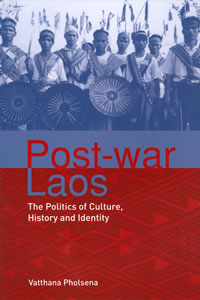Occasional NewMandala contributor Warren Mayes reports on a new book on Laos:
“Post-war Laos is one of the few academic works about Laos published by a Lao of the Diaspora. It seeks to assess the efficacy of sentiments of national belonging in light of the arbitrary formation of the colonial state and a history of outside influence leading to civil war, communist revolution and political authoritarianism. Vatthana Pholsena argues that ethnic minority cadres in the Lao government constitute a ‘section of society’ ignored by discourses of nation that assume a dominant majority and exotic minority ‘Others’. She engages extensively with Laos’ complex political history arguing that French colonialism not only defined scattered groups as ethnic minorities but opposition to it also provided minorities with a common sense of identity. Vatthana’s ethnography recognises the complex agency and rich meanings in the revolutionary tales and lives of ethnic minority elites. She concludes that the national discourse of the ‘new socialist man’ whose identities would no longer be defined by ethnic or religious loyalties, but by equality in social position has failed to emerge. While the book’s valuable ethnographic insights are hidden behind a complex discussion of history and theory, it is emblematic of new discourses on Laos emerging as more Lao are educated abroad and begin to pose questions about their country’s identity and history.”
 Facebook
Facebook  Twitter
Twitter  Soundcloud
Soundcloud  Youtube
Youtube  Rss
Rss 